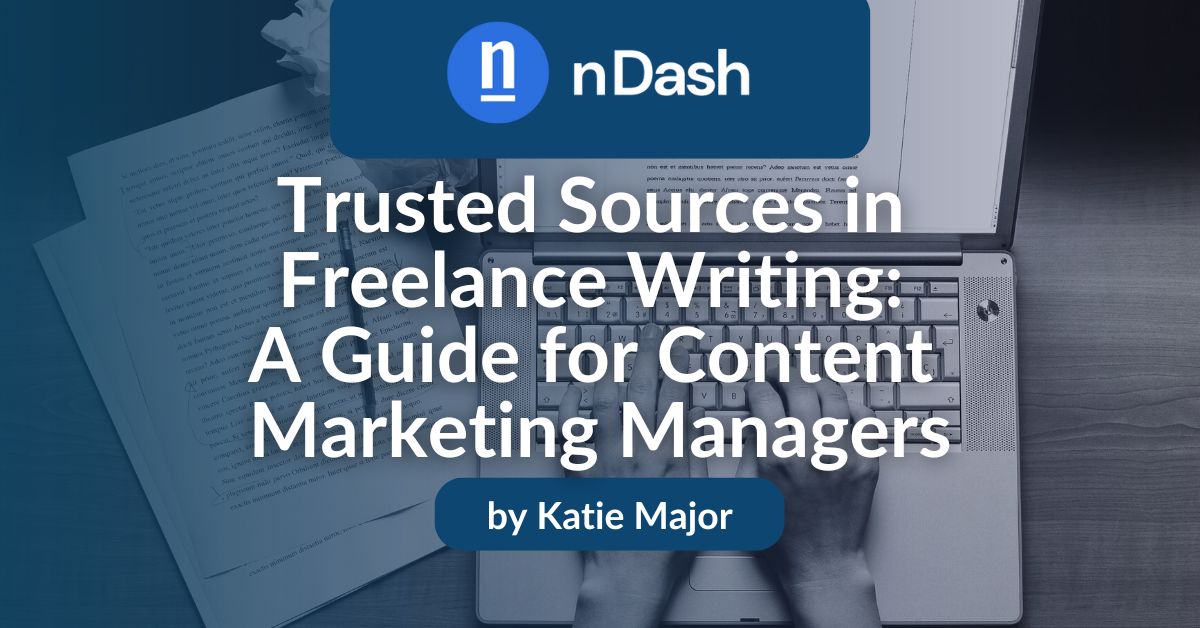Information—true or false—is very easy to find these days. This is great, but it also means content marketing managers need to be even more critical of their writing sources.
Google has made major updates to its search algorithms in recent years, including multiple core updates and the introduction of AI-driven features like the Search Generative Experience. These features are pretty convenient for quick searches, but we know AI can be wrong.
For content marketing managers, finding credible sources for writers is huge for delivering impactful content. It improves trust, strengthens the brands you work with, and generally helps your content perform better. In essence, we’re putting the ‘A’ in EEAT by finding these good sources.
So, what makes a credible source for writers? We’re going to explore that in this piece and provide some of our favorite go-tos when writing ourselves.
Why Freelance Writers Need Trusted Sources
For better or worse, in 2025, we will be inundated with AI on a daily basis. AI is often now used to write blogs, web copy, whitepapers – you name it. All in the name of making a task easier – and more cost-effective. But is it truly cost-effective?
Practically, AI can be really helpful for coming up with content ideas, finding keywords, and summarizing call notes. However, the rising use of AI in content means that sources have a chance of just being another recycled article. This has many negative implications, the least of which is the loss of content originality and creativity.
When Content Marketing Managers Assign Repetitive Articles on the Same Topic
Even without AI as a concern, many blogs and articles on the same subject are repurposed from others. For data-driven content marketers, this creates even more demand for trusted sources and originality.
If you’re citing an article that simply recycles the same information across multiple blogs, credibility takes a hit. Without solid, well-researched sources, your audience has no real reason to trust the accuracy of your content.
It’s the tepid trust of using poor sources that can damage an otherwise promising newsletter campaign or blog series. Ultimately, it can hurt a brand’s credibility.
The Role of Scholarly Articles and .gov Sites in Freelance Writing
Government and scholarly articles are backed by rigorous peer review and real-life research. This sort of credible source is essential when writing an article in academia, tech, energy, or medicine.
Yet, it’s important to understand the difference between scholarly articles and non-scholarly articles when researching your sources.
Let’s define the difference between the two:
- Scholarly articles are written by experts for experts in a particular field. They are subject to extensive peer and expert review. The purpose of a scholarly article generally is to analyze findings or share independent, original research.
- Non-scholarly articles are slightly more informal publications for public consumption. Think National Geographic, Time Magazine, The New Yorker, Popular Science, and more. These aren’t subject to peer review, but more than likely will be subject to editing and revisions before publication. These can be facts but also opinions.
A Note to Content Marketing Managers and Freelancers on Using .gov and .edu Sources
Websites with domains ending in .gov or .edu are considered more credible than those with .com, .net, or .ca domains.
This is not necessarily to say that .com websites are not credible. Website domains with .edu or .gov don’t have the same commercial interests as a .com website might. They exclusively belong to postsecondary educational institutions or US government offices.
For claims related to current stats or policy insights, .gov is your most reliable and up-to-date source.
Once again, it all boils down to interests. A domain that ends with .com may be a reputable source of information, such as the Search Engine Journal. However, SEJ has a longstanding reputation as an educational giant in the content marketing industry. Their interest, while still commercial, is in empowering content marketing managers and writers with SEO best practices.
This is because they’ve built up their brand awareness over time. However, it doesn’t mean that another website with a .com domain will hold the same authoritative weight.
Examples of Trusted Sources in Freelance Research
Let’s explore a few of our favorite sources when researching freelance articles:
Google Scholar for Academic Insights
Google Scholar is the perfect searchlight for credible scholarly articles from educational institutions and academic publishers.
You have easy and instant access to articles, theses, court opinions, and so much more!
Bureau of Labor Statistics for Workforce Data
BLS, to quote, is the “…principal fact-finding agency in the broad field of labor economics and statistics and serves as part of the U.S. Federal Statistical System. BLS collects, calculates, analyzes, and publishes data essential to the public, employers, researchers, and government organizations.”
This means you can rely on BLS data to provide accurate economic or employment insights.
National Institutes of Health (NIH)
The NIH provides a wealth of information on various health topics. Its website hosts a large research section that provides data on NIH clinics, library resources, and more.
The Benefits of Research-Driven Writing for Content Marketing Managers
Research-driven freelance writing benefits content marketing managers by ensuring each source is accurate and authoritative.
If a user reads an article with spotty sources that link to suspicious or spammy sites, eyebrows will rise. If the source is another blog covering the same topic, it doesn’t carry the same weight as a vetted reference.
The more you incorporate trusted sources, the more trust will grow with your content. From an SEO perspective, using credible sources adheres to Google’s EEAT principle and will perform better in search rankings.
Ultimately, a brand’s reputation hinges (in part) on care and attention to sources and writing quality.
Challenges Freelance Writers Face When Relying on Trusted Sources
Finding great references can come with snags in the writing process. Particularly when freelance writers are trying to incorporate scholarly and government resources into their work.
What Content Marketing Managers Should Understand About Access to Paywalled Research
Honestly, limited access to certain academic journals affects content creation. If you write about the subject frequently and have the financial means, consider subscribing to a journal.
Or, explore open-access databases like PubMed (NIH) or Google Scholar. These databases offer free peer-reviewed research. You can also use the site: search function to find studies and scholarly articles on a topic without a paywall.
Navigating Complex Data
Government reports and academic studies are full of valuable information, but the drawback is that they’re often not always reader-friendly. Content marketing managers will need to spend time distilling this complex data into clear, digestible takeaways.
Time Constraints and Source Verification
Finding the right source is half of the battle. Verifying the ones you’re unsure of and integrating the information into your content is another. Fact-checking takes work, especially if you need to cross-reference multiple sources for accuracy.
Yet, investing that extra time will strengthen you as a content marketing manager and boost the credibility of your piece.
Tips for Freelance Writers and Content Marketing Managers on Using Trusted Sources Effectively
Let’s tie this all together. It’s one thing to know you need credible sources, but another to put this into practice. Here’s how to incorporate this research into your writing workflow.
Identifying the Right Sources for Your Topic
Before anything else, we recommend creating an outline of your content so you know exactly what points you want to hit. Depending on your industry, start with authoritative sites like .gov, .edu, and industry-leading .com sites.
Use Google’s site search function (e.g., site:gov climate change) to find relevant studies.
Industry white papers, reputable news outlets, and academic databases like PubMed or Google Scholar are also great resources.
Simplifying Complex Information
Depending on your audience, the complex information you find on your research travels may be overwhelming for the average reader. Summarizing, analogies, and plain and practical language are your friends here.
How Content Marketing Managers and Freelances Balance Trusted Sources with Creativity
To piggyback off of the above point, factual writing about complex topics does not have to be dry! Anecdotes, analogies, quotes, and your own personal style will breathe life into otherwise dense facts.
Embracing Trusted Research: A Pathway to Excellence in Freelance Writing
Claims, facts, and numbers all need to be backed up – but finding credible sources for writers goes beyond that. Getting into this habit creates a domino effect.
The more research you immerse yourself in, the better your writing will be. The better your writing is, the more credible and authoritative your piece will be. Who knows, one well-researched article could open up the doors of a new writing niche to explore.

 Katie Major is a versatile marketing professional with a passion for content creation and strategic storytelling. She leads creative initiatives as Lead Creative at Major Marketing and serves as a Content Strategist and Copywriter at Katherine Major Creative. To learn more about Katherine — and to have her write for your brand — be sure to check out her
Katie Major is a versatile marketing professional with a passion for content creation and strategic storytelling. She leads creative initiatives as Lead Creative at Major Marketing and serves as a Content Strategist and Copywriter at Katherine Major Creative. To learn more about Katherine — and to have her write for your brand — be sure to check out her